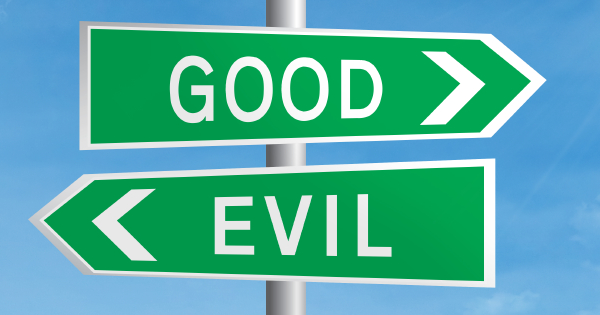An experienced teacher and Bahá’í, Debbie Tibbey writes about the nature of evil: is it a force in itself, or something else?
Perhaps the simplest way to explain the Bahá’i teaching about evil is to compare it to light and dark. Light is a physical reality, whereas darkness is the absence of light; it does not exist as an entity itself. In the same way, the Bahá’i Writings refer to evil as the absence of good:
Evil is non-existent; it is the absence of good; sickness is the loss of health; poverty the lack of riches. When wealth disappears you are poor; you look within the treasure box but find nothing there. Without knowledge there is ignorance; therefore ignorance is simply the lack of knowledge. Death is the absence of life. Therefore on the one hand we have existence; on the other, nonexistence, negation or absence of existence.
‘Abdu’l-Bahá, Foundations of World Unity, p. 76-79
One of the questions I am sometimes asked is whether an act of evil can be categorised as both natural and moral – which I understand as asking whether, if we act upon our natural impulses, we can still be judged in a moral way. Emotions such as anger are not ‘evil’ in themselves – we have the ability to feel them for a reason – but how we choose to use them determines whether our actions are ‘evil’ or not.
The answer to this is that desire, which is to ask for something more, is a praiseworthy quality provided that it is used suitably. So, if a man has the desire to acquire science and knowledge, or to become compassionate, generous and just, it is most praiseworthy. If he exercises his anger and wrath against the bloodthirsty tyrants who are like ferocious beasts, it is very praiseworthy; but if he does not use these qualities in a right way, they are blameworthy. … It is the same with all the natural qualities of man… if they be used and displayed in an unlawful way, they become blameworthy.
‘Abdu’l-Bahá, Some Answered Questions, pp. 250- 251
Sometimes people consider natural phenomena – earthquakes, floods and so on – as evil, asking why, if God is good, He would allow such things to happen. ‘Abdu’l-Bahá’s explanation can also be extended to the natural world: these phenomena are not evil in their own right, but can cause untold pain and suffering to us. They are ‘evil’ in relation to us, but not in themselves: if a volcano blows but injures no-one, is it a ‘good’ volcano in comparison to the one which erupts and destroys a village? It is our challenge as humans sharing this planet to increasingly understand natural forces and phenomena and help each other to be safe. So too, perhaps, with the damaging behaviours of some people.
Suffering is both a reminder and a guide. It stimulates us better to adapt ourselves to our environmental conditions, and thus leads the way to self-improvement. In every suffering one can find a meaning and a wisdom. But it is not always easy to find the secret of that wisdom. It is sometimes only when all our suffering has passed that we become aware of its usefulness. What man considers to be evil turns often to be a cause of infinite blessings. 3
Shoghi Effendi, Unfolding Destiny, p. 434
One final question I have been asked is whether it is possible to gain true happiness without natural evil. This is a thread which runs throughout religion, and the following passage seems appropriate:
‘’The mind and spirit of man advance when he is tried by suffering. The more the ground is ploughed the better the seed will grow, the better the harvest will be. Just as the plough furrows the earth deeply, purifying it of weeds and thistles, so suffering and tribulation free man from the petty affairs of this worldly life until he arrives at a state of complete detachment. His attitude in this world will be that of divine happiness. Man is, so to speak, unripe: the heat of the fire of suffering will mature him. Look back to the times past and you will find that the greatest men have suffered most.’
‘Abdu’l-Bahá, Paris Talks, p. 178
Perhaps, ultimately, it is how we react to the actions of others, the choices we make and the situations in which we find ourselves that define evil for each of us throughout our lives.
Debbie Tibbey, April 2020

